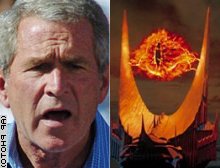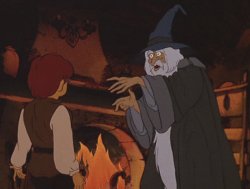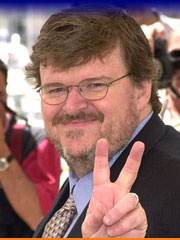(The link is courtesy of Aeon Skoble on Liberty and Power, who got it from Fark.)
Among the wits who brought you such straight-to-DVD cinematic masterpieces as FahrenHYPE 9/11
(which is advertised as a rationalization for your preconceived conclusions about Michael Moore) and Celsius 41.11
, this, apparently, is the sort of thing that passes for sophisticated satire:
Fellowship 9/11
. . .
Michael Moore’s searing examination of the Aragorn
administration’s actions in the wake of the tragic
events at Helms Deep. With his characteristic humor
and dogged commitment to uncovering — or if
necessary fabricating — the facts, Moore considers
the reign of the son of Arathorn and where it has
led us. He looks at how — and why — Aragorn and
his inner circle avoided pursuing the Saruman
connection to Helms Deep, despite the fact that 9 out
of every 10 Orcs that attacked the castle were actually
Uruk-hai who were spawned in and financed by Isengard.
… and the film goes on like that.

Fighting the War on Evil
Now, I don’t have any problem with a good send-up of Michael Moore; but as satire, this is as artless as a MAD Magazine comic, and ends up making warhawks look an awful lot sillier than Michael Moore.
If George Bush were personally going into battle to lead the fight against a massive assault already launched against all the strongholds of the civilized world, by monstrous armies of vile, inhuman goblins, directed by undead great lords of men, and bent to the unholy will of a supernatural Dark Lord who desires nothing less than the complete desolation and domination of the whole Earth, then I don’t doubt that Michael Moore would not have had quite the same objections to Mr. Bush or to his policies.

Misunderstandings of Tolkien’s work abound.
Do warhawks actually think of the war against Iraq like this? As much you might be inclined to say, Come off it, it’s just a stupid joke
, the fact is that much of their rhetoric outside of this silly little film seems to indicate that they honest-to-God do. And if they do, it would be very funny–except for all the people who have died because of such childish conceptions of the world.
J.R.R. Tolkien, for his part, put it this way:
The real war does not resemble the legendary war in its process
or its conclusion. If it had inspired or directed the development
of the legend, then certainly the Ring would have been seized and
used against Sauron; he would not have been annihilated but
enslaved, and Barad-d?@c3;bb;r would not have been destroyed but
occupied. Saruman, failing to get possession of the Ring, would in
the confusion and treacheries of the time have found in Mordor the
missing links in his own researches into Ring-lore, and before long
he would have made a Great Ring of his own with which to challenge
the self-styled Ruler of Middle-earth. In that conflict, both sides
would have held hobbits in hatred and contempt: they would not long
have survived even as slaves.
. . .
An author cannot of course remain wholly unaffected by his
experience, but the ways in which a story-germ uses the soil of
experience are extremely complex, and attempts to define the
process are at best guesses from evidence that is inadequate and
ambiguous. It is also false, though naturally attractive, when the
lives of an author and critic have overlapped, to suppose that the
movements of thought or the events of times common to both were
necessarily the most powerful influences. One has indeed personally
to come under the shadow of war to feel fully its oppression; but
as the years go by it seems now often forgotten that to be caught
in youth by 1914 was no less hideous an experience than to be
involved in 1939 and the following years. By 1918 all but one of my
close friends were dead.
–Foreword to the Second Edition of The Lord of the Rings
And this way:
Life in camp seems not to have changed at all, and what makes it
so exasperating is the fact that all its worse features are
unnecessary, and due to human stupidity which (as planners
refuse to see) is always magnified indefinitely by
organization
. . . . However it is, humans being what they
are, quite inevitable, and the only cure (short of universal
Conversion), is not to have wars — nor planning, nor organization,
nor regimentation.
–from a letter to Christopher Tolkien, 6 May 1944,
Letters of J.R.R. Tolkien #66


